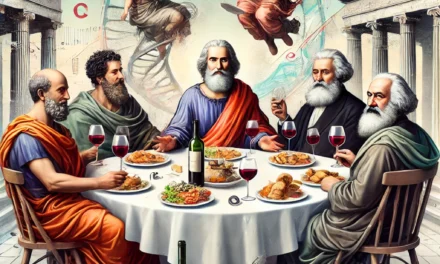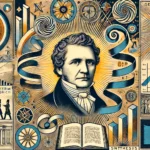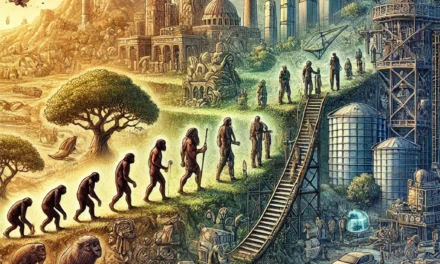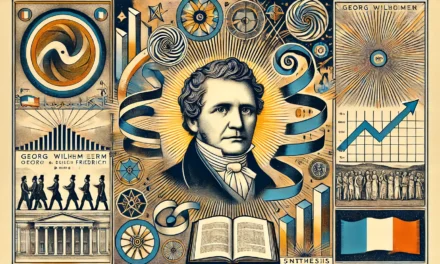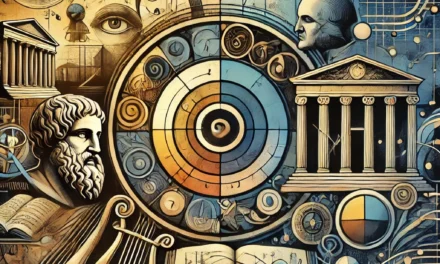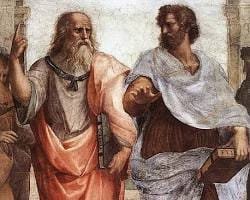
Hegel and the Concept of History: A Critical Review

Hegel and the Concept of History: A Critical Review
In his book The Philosophy of History, originally titled Die Vernunft in der Geschichte (Reason in History), Hegel approaches history from a philosophical perspective. In order to understand this perspective, it is first necessary to have some familiarity with the general outlines of Hegel’s philosophical system. Therefore, this paper will begin by providing a brief summary of Hegel’s system.
The Determinations of Reason
I would like to remind the reader that understanding Hegel’s philosophy, including the subject we are discussing here, requires reading it as a whole. Furthermore, merely reading his works will not provide the reader with the satisfaction they seek. Understanding Hegel depends on a critical evaluation of the material conditions of his time, the intellectual heritage of the era, and the critical assessment of the Kant-Fichte-Schelling triad.
This is for two reasons: The first is historicity; the moment of the development of the bourgeois era gave Hegel precedence in seeing, addressing, and presenting things in their historical context. Without a doubt, there were many authoritative philosophers during his time, but this also stemmed from his encyclopedic knowledge and his genius. It can be said that he seized the priority that the bourgeois age offered, and rightly took his place as the greatest philosopher in history.
Those who acknowledge Hegel’s position in history are almost exclusively Marxists. So much so that in his Philosophical Notebooks, Lenin linked the understanding of Marx’s Capital to the understanding of Hegel’s Logic. Today, I can confidently say that Marxism cannot be understood without understanding Hegel, which means understanding the entire system of philosophy. Every time we encounter modern problems produced by our era, we must turn to Hegel, and this is entirely based on this reality.
The second reason is logicality. For the first time, Hegel approached a science within its historicity and its internal interconnectedness as a whole. Let us immediately add that Marx did the same in Capital, and this has not been seen even in Marxist literature since. It can be said that no Marxist, including Lenin, has ever approached and worked on a science at the level of Hegel-Marx. Concepts such as being and nothingness cannot be understood without understanding the concept of becoming, and the concept of becoming cannot be understood without understanding the concept of essence, and so on. Therefore, it is futile to discuss parts without understanding the whole or assuming a general understanding of the whole.
Now let us take a closer look at Hegel’s system.
We have already mentioned that the concept of Reason (Us) is the central concept of Hegel’s philosophy. So much so that all concepts and their actualizations are revealed as determinations of Reason.
In accordance with the philosophical tradition of his time, Hegel assumes that above individual thoughts, there is an objective Reason that governs them and a totality of concepts. For this reason, Hegel’s idealism is called objective idealism.
What drives the process in Hegel is “Contradiction.” Contradiction resolves itself in a speculative mode, but in the mode it has now reached, it faces new contradictions, and thus the development continues.
Development manifests itself in three moments:
- Affirmative mode
- Negative (Dialectical) mode
- Speculative mode
All these modes acquire their functionality in the process of actualization within Spirit (Geist). Likewise, these modes are the determinations of the Concept. Reason embarks on this historical journey to actualize freedom. In this journey, Reason first takes place in the spatio-temporal world. The term that denotes Reason as history is Spirit (Geist).
Spirit is initially in itself. Here, as absolute reality, it knows itself, and here, as the Idea that thinks itself, it is Logic. Hegel says, “Logic is the knowledge that the Idea is a single unity.” Logic consists of the Doctrine of Being, the Doctrine of Essence, and the Doctrine of the Concept.
From here, Hegel says, “We return to the concept of the Idea with which we began. At the same time, this return to the beginning is progress. What we began with was Being, Abstract Being; now we have before us the Idea as Being, but this Idea that exists is Nature,” thus transitioning to the philosophy of nature.
Spirit as Nature
Nature progresses from inorganic nature to organic nature, and from there to man as a thinking being. Nature is alienated Spirit. This alienation will be overcome by Spirit becoming self-aware in man. Along with man who comprehends nature through thought, Spirit knows itself as Spirit and reveals itself.
Spirit as Emerging from the World of Culture
It first appears in man, as (a) Subjective Spirit. From here, it appears in society as relations between people; (b) Objective Spirit.
Here, the individual will merge with the general will. It adopts general morality as its own morality and feels the law above itself as its law.
The Spirit that reaches self-consciousness is (c) Absolute Spirit—Religion, art, and philosophy. Spirit lives its true conscious adventure in the world of culture, and it views the entire historical process as its own actualization and comprehends it in philosophy.
Thus, Reason understands the historical act as its actualization. The completion of Reason signifies its liberation because freedom is the awareness of necessity. That is, it is knowing the laws that dominate man in nature and his social nature and bringing them under his control. Therefore, Reason is the ruler. Already, this knowledge shows him that he is reality itself. Reality, as absolute reality, is God.
In this way, we provide a schematic presentation of Hegel’s system or rather the historical journey of Reason.
“Was vernünftig ist, das ist wirklich,
und was wirklich ist, das ist vernünftig.”
“What is rational is real,
and what is real is rational.”
What is thought, understood, and comprehended by reason alone exists as reality, and what exists as reality is what is comprehended, understood, and thought by reason. This determination is almost like a summary of Hegel’s entire system. For this reason, it has absolute depth.
Just as the comprehensibility of Hegel’s philosophy is connected to the material living conditions of his era and its intellectual heritage, now we must also understand this determination by considering its place in Hegel’s system and how he handles it.
Even children know the difference between themselves and nature. The first humans also knew this. Humanization began with humans distinguishing themselves from nature and developing a consciousness of being different from nature. Every human knows that their thoughts, their Reason (intellect), are products and that they have no ontological connection with nature. Human thought is not something like natural beings that people find and use, already present in nature. However, at the same time, humans are a product of nature, a natural being. Is the human’s organic (living) natural being the connection between nature and human thought?
From ancient times to the present, this has been a topic that philosophers have built countless systems around. This duality (dual structure) has been the most important philosophical problem that philosophy has tried to overcome throughout history. Some have leaned towards nature, claiming that nature is the primordial being, while others have said that everything, including nature, is the creation of Reason (the intellect).
Kant and Fichte’s Approach to the Problem of Dualism
Kant attempted to overcome this problem by constructing his philosophy on a form of dualism. However, while he accepted natural existence as the Noumenon (the thing-in-itself) behind the phenomenon, he developed an agnostic epistemology, claiming that the Noumenon could not be grasped by Reason. According to him, we could only know the phenomena that present us with the characteristics of the Noumenon, but not the Noumenon itself.
Fichte, who was a contemporary and friend of Hegel, and at the same time the intellectual link between Kant and Hegel, offered a response to this. Fichte attempted to overcome Kant’s dualism by developing a system that accepted the ‘I’ as absolute, as a rational human being. Everything, including nature, is the creation of this ‘I’. Fichte, rightly, rejected Kant’s unknowable Noumenon (the thing-in-itself), arguing that we know not only the characteristics of beings but also the beings themselves. For beings exist through their characteristics, and a being abstracted from its characteristics is nothing. Thus, Fichte presented the Noumenon as the creation and realized will of the ‘I’.
Fichte’s ‘I’ is the conceptualization of the bourgeois individual, a product of conditions in which commodity-dependent relations increasingly declared their hegemony, desiring and acting on everything through their own free will, preparing for the reconstruction of the world. However, Fichte placed the ‘I’ in such an absolute position that it excluded nature as an existence in itself.
Hegel rejected this idealism of Fichte. He argued that if something exists outside the ‘I’, whether it is created by the ‘I’ or not, the ‘I’ cannot be absolute. Therefore, Fichte’s idealism is unacceptable. In this way, the ‘I’, as Reason, abolishes the conditions of its own existence and, in an attempt to make itself absolute, annihilates itself.
We cannot overcome this dualism by, in a materialistic reversal, taking Reason (thought, consciousness, spirit, etc.) as a product of matter, by taking matter as absolute. In that case, we would consider reality as a mindless, irrational, base existence. Our effort to glorify reality by declaring the material as absolute results in treating it as a thoughtless, inferior existence. Absolutizing reality leads to self-negation, just as absolutizing Reason does. Therefore, it is unacceptable:
“The reality of the rational conflicts not only with the view that ideas and ideals are nothing but empty images and that philosophy is a system of such fabrications but also with the opposing view that ideas and ideals are so exceptional or so powerless that they cannot possess reality. In short, the object of philosophy is such a reality that, in it, those things—institutions, conditions, etc.—are merely superficial external aspects.”
The Science of Logic
Hegel overcame the dualism that had placed Reason and reality in opposition through metaphysical abstraction, by using his dialectical understanding. In order to comprehend being, it is not necessary to eliminate the contradictions within it but, on the contrary, to reveal these contradictions as the true nature of being.
This new perspective does not give Reason a privileged position over nature (or over external existence, as opposed to Reason); rather, it demonstrates dialectically that Reason exists only with its opposite, nature (and nature only exists with its opposite, Reason). This aphorism of Hegel transcends, in a dialectical manner, the dualism and metaphysical absolutization between Reason and Reality that had not been surpassed in the history of thought. For this reason alone, despite attacks against him, it possesses absolute value.
Let us take a closer look at this determination to better understand Hegel’s political philosophy: Let’s return to its ancient roots, to Aristotle, where these discussions and related debates first began. This will help clarify this determination.
Aristotle says, “There is nothing in the intellect that was not first in the senses.”
This statement places Aristotle at the very foundation of Empiricism, establishing him as its founder. While Plato took the idea (form) as absolute reality, Aristotle in his discussions with Plato directed his attention toward reality as actuality.
Hegel does not interpret this as mere ordinary actuality but as actuality as an idea. In this way, he believes he has achieved a reconciliation between Aristotle and Plato in his philosophy. According to him, the idea should be seen as the inner that exists outside, from beginning to end, thus as the unity of the inner and the outer, or in the emphasized sense given here, as actuality.
Within this interpretation, Hegel, so to speak, reverses Aristotle’s statement mentioned above:
“There is nothing in the senses or experience that has not already existed in thought.”
It is clear that Hegel understands actuality as the actuality of the idea. So, what is actuality?
Hegel defines actuality in his Science of Logic as the immediate unity of essence and existence, of the inner and the outer. The inner is the form of the idea that has externalized itself in nature, and precisely because of this, it is what is internal to nature. If we take Hegel’s example, a child, as a human being in general, is undoubtedly a rational being, but the child is not aware of this rationality. Rationality exists in the child as a potential, an aptitude, etc. But this inner potential is also its externality. That is, the child develops their rationality as an effect of the external world upon them, such as through the education they will receive or the language they will learn.
The difficulty of these passages lies in the transition from Hegel’s Logic to the philosophy of nature. The reason is that these passages are almost entirely filled with theological elements, and Hegel attempts to present them in a philosophical system, or rather, to legitimize them.
“And according to this,” says Hegel, “nature is a revelation of God, just as much as the spiritual world is, and the difference between them is that nature cannot reach the consciousness of its divine essence, while this is the definite task of finite Spirit. God conveys and reveals Himself, and surely first through nature and in it.” And Hegel quotes the Bible: “By their fruits, you will recognize them.” However, by taking actuality as idea in its otherness and uniting Essence with Being and Becoming, Hegel somewhat frees himself from this theological framework.
Hegel’s truth is pure becoming. Therefore, the reality that reason approves of is not the accidental acceptance of what is given (actual).
Hegel declares in the preface to Elements of the Philosophy of Right that “What is rational is real, and what is real is rational.” So let us take a closer look at the principles of the Philosophy of Right.
I would like to draw the reader’s attention back to the schema I previously presented. Here, reason unfolds itself in space and time as history in Spirit. From there, it proceeds to nature and ultimately reaches the spiritual world of finite Spirit, which we mentioned earlier emerges in the cultural world and is divided into three: Subjective Spirit, Objective Spirit, and Absolute Spirit, which includes religion, art, and philosophy.
The principles of the Philosophy of Right correspond to the end of the first triad and the second in the second triad, specifically the domain of Objective Spirit, which is the area where Hegel brings reason into the closest relationship with actuality.
Thomas Hobbes defines society as a “war of all against all,” and Rousseau as a “social contract.” All concepts of social life and history must, in some way, be considered in terms of the contradiction between the collective nature that humans are born with and their individual free will, as they produce and reproduce themselves socially. According to the Philosophy of Right, it must begin with the development of will and the forms that the will takes within social relations. The fundamental relation of Objective Spirit is the relationship between free individuals, or for Hegel, the same thing: the relationship between property owners.
The Philosophy of Right is divided into three main sections: Abstract Right, Morality, and Ethical Life. Abstract Right covers Property, Contract, and Wrong/Crime. Morality covers Purpose, Intention, and Good. Ethical Life includes Family, Civil Society, and State. Thus, we see that Abstract Right progresses from entirely abstract concepts to more concrete ones.
Real Right and Ethics is Ethical Life, and real Ethical Life is the State. Therefore, property and ethics are moments in the development of the State.
Civil Society is a concept developed by Hegel. He discovered an area where individuals’ positions are defined within the relations of production, independent of the state, that is, independent of politics. Hegel’s major achievement here was recognizing civil society as the fundamental domain upon which the modern state is built. Civil society is the characteristic feature of the contemporary state. Hegel showed that pre-modern state structures, including those of the Middle Ages, did not have a separate structure standing above society, beyond the family and the mode of social production. In stark contrast, modern society, historically, rises independently of the state within distinct moments. This is an extremely important conceptualization because it also helps us understand how the state, standing apart from the family and mode of production, historically emerges on the scene as a necessary outcome of the relations between people and the mode of social production.
Thus, we see that Hegel’s understanding of politics and history forms part of a holistic structure, with each element being part of a greater whole. Hegel’s social theory, without falling into metaphysics, integrates everything within a process. He presents the unfolding of Objective Spirit as follows: “States, nations, and individuals, throughout history, are the unconscious instruments of the world Spirit in which they exist together.” Hegel derives the empirical data for his views from his contemporary bourgeois state.
It is also shown that the State is the collective representative of free wills. Here again, Hegel argues that the state must balance individual, conflicting interests, but inversely, he asserts that the state cannot exist outside the determinations of collective Reason.
He says that philosophy when examining the spiritual universe as well as the natural universe, begins with this determination. It can be asserted that thought possesses a reality in external actuality, in the ground where it forms; thus, the idea is merely a representation that forms itself through experience and only has value as thought.
Hegel says that philosophy responds to these by stating, “There is no reality except the idea.” That is, the external reality he believes he is examining is nothing more than a determination of the idea itself. When he thinks he is studying external reality, he is, in fact, studying himself.
Hegel explains that “the rational, synonymous with the idea, enters into external existence with its reality, gaining an infinite richness of forms, appearances, and manifestations, like a seed covered by a shell. Consciousness initially resides in this shell, and finally penetrates the concept, discovering its inner heartbeat, and begins to hear the same beats beneath its external appearance.” He continues: “Indeed, in the most concrete sense, form is rational knowledge in the concept, and the content is reason as the essential nature of both moral and natural reality.” (Philosophy of Right, p. 30)
Hegel glorifies the resolve to accept nothing that has not been verified by thought. Reason, he says, refuses to leave reality untouched, even if that reality is the state.
Thus, Hegel first emphasizes the rational origin of actuality and, secondly, demonstrates that everything is temporary and weak in the face of Reason.
“The idea is what is truly real in itself and for itself, the absolute unity of the concept and objectivity.” Now, let us turn to Hegel’s concept of reality. Everything will become clearer before our eyes. In Hegel, reality is the identity of objectivity with the concept.
But how is this manifested? For example, when we speak of a real state or a real work of art, it is revealed when these objects are as they should be when their actuality corresponds to their concept. Thus, the unreality of something is its failure to act in accordance with its concept or determination. Anything that lacks the identity of concept and actuality cannot endure. Even bad and untrue things exist only as long as their actuality still corresponds to their concept in some way. Anything completely bad or opposed to the concept is, for this reason, lost within itself. Things endure in the world only through their rationality.
It is clear that this determination, along with its central concept of Reason, approaches the given states of things critically. Hegel asserts that for something to become actual, it must be rational. This denies the hegemony and permanence of existing structures and, moreover, declares their transience.
“… I will show that there is no idea of a state because the state is a mechanism, and there can be no idea of a mechanism. Only something that is an object of freedom can be called an idea. Therefore, we must go beyond the state! For every state must treat free people as if they are cogs in a machine, but it should not do this, and thus it must come to an end.” (Stuttgart, p. 219)
Philosophy of History of Hegel
In Hegel, all becoming is the realization of being, the actualization of the Idea. The internal energy inherent in it causes all things to come into being. However, its success depends on its transition into absolute reality. Therefore, reason does not remain in itself; it develops both in time and in space. Initially, the idea develops in space as nature. Then, the idea develops in time as spirit. This time is not physical time, as is often misunderstood. Time is a mental process. Thus, this development, or more accurately, the realization of the idea, is, in a sense, a logical process. On the other hand, it is a temporal, natural development. And ultimately, it is conceived as history. The necessity of its conception in history lies in the fact that consciousness, which will come to know itself, will manifest itself as a human on the stage of history. Thus, history is the movement or development of the idea. The philosophy of history is the study of this realization of the idea in history. “Philosophy of history is nothing other than the thoughtful consideration of history…”
Reason in History
Hegel’s systematic thought is composed of triads, or trilogies: abstract, negative, and concrete aspects. In reality, this is a dualism because the concrete aspect, which is the whole, is the unity of the abstract and negative aspects. It is itself the abstract aspect of another concrete. Every concept is concrete in relation to the preceding concept and abstract in relation to the succeeding concept. Dialectics is a dualistic structure. It is the modern version of the ancient gray tones of the human intellect, which could not grasp the transitions between phenomena. Movement is understood only as the conflict of two opposites.
As has always been misunderstood and misrepresented by Marxists, the triad of thesis, antithesis, and synthesis does not belong to Hegel. Hegel’s philosophy of history is part of the science of sciences, the thinking of thinking, in the triad of nature, mind, and spirit, specifically in the spirit part. Logic examines the laws of thought moving within itself, the natural sciences examine the laws of the idea realized in nature, the laws of the externalized idea, and the philosophy of mind studies the human sciences, or more precisely, the laws of the idea as it knows itself as the idea. In this field, the idea is spirit.
Hegel examines the spirit in three categories: subjective spirit, which is the realm where he studies the soul, consciousness, and psychology as the inner consciousness of the human being; objective spirit, which is the realm where he studies human relations as abstract right, morality, and ethical life; and absolute spirit, which is the realm where art, religion, and philosophy are examined. Human ethical life is divided into three categories: family, civil society, and the state. He divides the state into three categories: constitutional law, international law, and, finally, world history, which is the subject of the book we are examining.
World history is divided into three categories: the Oriental world, where only one person (a despot) is free; the Ancient Greek world, where some people are free; and the Christian world, where everyone is free.
Under the heading of the Oriental world, Hegel examines ancient Chinese, Indian, and Persian civilizations and makes some interesting observations about the Turks:
“On the other hand, we see in the Turks that subjective will is entirely left to its own devices. For example, the Janissaries have a will, they act with their will, but it is a wild will, partly under the pressure of religion, but otherwise unlimited in doing whatever it wants. Here, individual will is falsely conceived as free: it is not fused with rational, concrete will. Such a will is not recognized, it is not made an object for itself, and its behaviour is not determined by it; if it touches upon something general, this general thing remains abstract and mechanical, becoming fanatical, damaging any form of state organization and morality, and disregarding laws and justice.”
Hegel’s approach is centered on Christian and German-Alman nationalism. For this reason, he views Eastern peoples as nations unaware of themselves and therefore not free.
“The Eastern peoples do not know that Spirit, or humans as Spirit, is free in itself. Because they do not know this, they are not free. They recognize only one person as free; but this kind of freedom is nothing but arbitrariness, savagery, a natural accident, or a passion that is either indolent or tamed and subdued by despotic authority. This one person is merely a despot, not a free man, not a human.”
Under the heading of the Classical Ancient world, Hegel examines Greece and Rome.
“First in Greece, the consciousness of freedom arose, and thus the Greeks became free. But like the Romans, they too only recognized some people as free, not all humans as free. Neither Plato nor Aristotle knew that humans are free as human beings; thus, the Greeks not only limited their beautiful freedom by possessing slaves, but their freedom also became, in part, a random, uncultivated, withering, insufficient flower, and in part, the brutal enslavement of humans by humans.”
And finally, in the Christian world, Spirit has found its true condition of liberation and embodied itself in the national consciousness of the Germans.
“In the Christian world, it was the Germanic nations who first became conscious that humans are free as human beings and that the freedom of Spirit constitutes human nature. This consciousness first arose in religion, in this deepest region of Spirit; but to bring this principle into the worldly essence, to resolve and apply it, was a more extensive problem requiring a long process of cultural effort. For example, slavery did not immediately disappear with the acceptance of Christianity, nor did freedom prevail in states; neither governments nor constitutions were organized in accordance with reason, nor were they based on the principle of freedom. The application of this principle to worldly affairs, its penetration into the world and its formation, is the very chain of events that constitutes history… The principle of Christianity, both in terms of the consciousness of freedom and the general principle of freedom, is significant. World History is the progress of the consciousness of freedom, and this progress is one we are compelled to recognize as necessary.”
Thus, history, like the holy, promised land in the sacred books of the Israelites, becomes, in Hegel’s view, the history of German national liberation. Hegel begins his examination by discussing the general concept of the philosophy of history. He says we cannot set thinking aside because humans are thinkers. Spirit realizes itself in history as human thought, not as individual human thought, but as the collective thought of peoples and nations. Here, the determination of the idea is revealed as the living spirit of these nations as they produce their thoughts, arts, and religions. The idea, now as spirit, becomes the self-revealed consciousness of living peoples. As I have mentioned above, Hegel classifies nations based on the degree to which this consciousness is revealed.
The General Concept of the Philosophy of History states: “Reason, that is, Substance, as Infinite Power, is the Infinite Matter of all natural and spiritual life.” Therefore, “The only concept that philosophy brings to history is the concept of Reason, according to which Reason governs the world, and everything in World History has happened in accordance with Reason.”
“As Infinite Form, Reason is the realization of the content it carries within itself; by Substance, we mean that which gives all reality its existence and permanence; to say that Reason is Infinite Power means that it is not so weak as to confine its content to the realm of the Ideal and Necessity, or to leave reality as a particular thing existing outside, perhaps in the minds of some people; by Infinite Content, we mean all Essence and Truth; this Infinite Content is its own matter, and it gives this matter to be worked upon by its own activity. Reason, unlike a finite action, does not require external materials, preconditions, or ready-made tools to nourish itself or to acquire objects for its activity; it nourishes itself, it is its own material, and it works upon this material. It is both its own precondition and the absolute End Goal it seeks to achieve, and the externalization of both the natural and spiritual Universe takes place in the realm of appearance: this occurs in World History. This Idea, the true, Infinite, and absolutely Powerful Idea, reveals itself to the world, and what it reveals is nothing other than its own grandeur, which is proven and assumed in philosophy.”
So, everything in world history is in accordance with reason. But what is its connection to Spirit? “World history has been the necessary progress of the World Spirit in accordance with reason.” Therefore, Spirit—the World Spirit—is the substance of history. It is the World Spirit that makes history.
Within this framework, Hegel examines different ways of studying history. Undoubtedly, these are incorrect and incomplete forms: source-based and reflective history. Then comes philosophical history, which is his own approach…
“As a first condition, we could assert that we have correctly grasped what is historical; yet in such general expressions, no matter how accurate and well-understood they may be, there is always ambiguity. ‘To someone who looks at the world with the eye of reason, the world looks back with the eye of reason; these are reciprocal.’ On the other hand, separate methods of examination, viewpoints, and ways of judging quickly lead us to matters of importance and insignificance; these are the categories that first come to mind among the infinite material lying before us.”
The philosophical understanding of history is also the history of how history is viewed through reason. “It was first advanced by the Greek philosopher Anaxagoras: according to him, Nous, in general terms Mind or Reason, governs the world. However, it is not Reason in the sense of a self-conscious intelligence or a Spirit so defined.”
“This thought passed from Anaxagoras to Socrates, and if we disregard the teaching of Epicurus, who found the cause of all events in chance, it became, for the first time in the history of philosophy, a widespread and dominant view: the time will come when we see over which religions and nations it held sway.”
“Plato, through the mouth of Socrates (Phaedo, Steph. 97-98), discusses whether this reasoning is conscious or unconscious: ‘I had confidently hoped to find a teacher who could explain nature to me according to reason, who would show me the particular purpose in the particular thing, the general purpose in the whole, the ultimate purpose, the Good.’ I had not yet lost this hope. Socrates continues, ‘But as soon as I eagerly embraced the writings of Anaxagoras, I realized how greatly I had been deceived; I understood that Anaxagoras was offering, not Reason, but external causes like air, ether, and water instead.’”
It is clear that the inadequacy Socrates found in Anaxagoras’ principle does not lie with the principle itself but with the lack of its application to concrete nature. Nature could not be understood or comprehended based on this principle. Here, from the very beginning, I want to make the distinction between a principle or truth remaining in abstract form and its continuation toward a closer determination or concrete development. This distinction is fundamental.”
“I presented this first appearance of thought, namely the principle that Reason governs the world, and the deficiency in this principle; it is the same principle that, for us, finds its full application in another form of being familiar to us and convinces us of the above appearance: the religious truth that the world is not at the mercy of chance or external, accidental causes, but is governed by Providence. Earlier, I had said that I did not wish to make any claims about our beliefs regarding the mentioned principle; however, I can still focus on these religious beliefs because the special feature of philosophical science is that it never allows assumptions to be taken as valid. On the other hand, the science we are discussing must, first and foremost, provide proof, not necessarily of the Truth of the above principle, but at least of its conformity to rule, by first presenting the concrete. The given principle that divine Providence certainly precedes all events on earth corresponds to this principle. For divine Providence is the wisdom of the infinite Power that fulfils its purpose, that is, the absolute, Reasonable ultimate end toward which the world is directed; it is Reason, self-determining Thought, Nous.”
Hegel thus proves, to himself and to us, that history is governed by reason. But how does this governance take place? What is its mode? It operates according to a plan. The task of philosophy is to uncover this plan of reason.
“We tend to attribute things to human passions, a stronger army, the talent or genius of this or that individual, or the absence of these qualities in a particular state. These are the natural, accidental causes that Socrates criticized in Anaxagoras. There is a tendency to stop at abstraction and to be satisfied with the vague generalization of the idea of Providence without giving it further determination. The precision in Providence, that is, the way Providence behaves, is referred to as the plan of Providence (this is called fate or the aims and instruments of this plan). But this plan is something hidden from our eyes, and to want to know this plan is to rely on an unfounded assumption. Anaxagoras’ ignorance of how Reason unfolds itself in reality was natural; thinking, that is, the consciousness of thought, had not progressed further in him or generally in Greece. Anaxagoras could not apply the general principle to the concrete in order to grasp the concrete under the light of the general. It was Socrates who took the first step toward grasping the union of the concrete with the general, albeit in a somewhat subjective and one-sided manner: Anaxagoras was not opposed to such an application. However, this faith, at least in large-scale application, falters, denying what is known about the plan of Providence. For in one situation or another, this plan is particularly accepted, and devout souls, in many individual events that others see only as chance, see not only the general decrees of God but also the fate shaped by divine Providence according to its purposes.”
The teleology of history is evident, but whose teleology is it?
“However, the individuals we examine in World History are entirely peoples and states; therefore, we cannot linger in the shop that auctions off the supposed Providence, nor can we remain with abstract, indeterminate beliefs about Providence without wanting to advance to determination. On the contrary, we must be much more serious about this matter. The concrete: being, the paths Providence follows, the instruments and appearances in history, are clearly before us; what is required of us is only to connect these to the mentioned general principle. What is the religion in which God, Spirit, reveals itself? ‘In the Christian religion, God has revealed Himself to the world; that is, He has shown humanity what He is, and He did not remain hidden or concealed.’”
“When we speak of Reason, we often fail to specify its determination, its content, the criterion by which we can judge whether something is based on Reason. To understand Reason in accordance with its own determination is the first thing that needs to be done; everything else will follow naturally as long as we do not stray from the path of Reason. With this task we have set for ourselves, we now arrive at the second point we wish to discuss in this introduction.”
The Realization of Spirit in History
“We must pay attention to the fact that World History takes place on a spiritual ground. The world brings together both spiritual and physical nature within itself. Physical nature simultaneously encompasses World History. Here, we emphasize these fundamental conditions related to the determination of nature from the very beginning. On the other hand, Spirit and its developmental process are substantial.”
World history is the most concrete ground for the realization of Spirit.
Determination of Spirit
“The first topic to be emphasized is the abstract determination of Spirit. According to this abstract determination, the place that World History manifests and reveals itself is World History.” The manifestation of Spirit in world history is the degree to which nations develop their self-consciousness. Based on this, Hegel subjects them to classification. Self-knowledge also reflects the level of freedom of that people. Hegel connects liberation to the level of freedom of nations and the level of realization of Spirit.
“But in the form presented, this freedom is a vague or polysemous word, which has brought with it infinite disagreements, confusions, misconceptions, and every possible excess, as well known as it has ever been, especially in our time.”
In this context, freedom is the aim of Spirit. “It is the aim of itself. It is the only aim of Spirit.” So, what will Spirit choose as the means of realizing its liberation? Is there a means for the liberation of Spirit?
Means of Realization of Spirit
“The question of the means through which freedom brings itself into the world leads us directly to the very appearance of history. Although freedom is a more internal concept as freedom, its means, as observed in history, emerges externally and visibly. At first glance, history displays the behaviors of humans arising from their needs, passions, interests, ideals, and objectives, and their characters and abilities. In this activity, the strings are entirely in the hands of these needs, passions, interests, etc. Individuals tend toward more general aims, the Good, but they also desire that this Good be limited. For instance, a love of the noble homeland—which has little relationship with the world and its general aim, or love for family, or love for friends—generally encompasses truth, honesty, and in short, all virtues. We can only observe that Reason, which is the fate of these subjects and their spheres of influence, realizes itself only through these virtues. However, we must compare these subjects with the remaining individuals; only then is it understandable that these are single individuals that form a small ratio according to the entire human race. For this reason, their area of influence is relatively small. Moreover, here, passions are the strongest factors of self-interest, the satisfaction of specific interests. Their power lies in disregarding the limits that justice and morality want to impose and in the natural violence of their passions that is much closer to humanity than the boring discipline of order, measure, justice, and morality.”
“When we consider the results of irrationality within history, and look upon the collapse of the most advanced kingdoms constructed by human intellect, the indescribable misery and pain of individuals, our hearts fill with sorrow in the face of this transience.”
“The first thing to be said in this regard is that the principle, the ultimate aim, fate, or what we call the essence of Spirit as Spirit is only a general, abstract thing. The principle, the fundamental principle, the law; is a general inner thing, and as such, no matter how correct it may be in itself, it is not entirely real. Aims, fundamental principles, etc., exist in our thoughts, above all in our intentions, or in books, but they do not yet exist in reality. Its essence is a potential, a hidden power, but it has not emerged from itself into existence. For it to gain reality, a second element must be added: that is activity, realization; its principle is will, the activity of people in the world in general. Only through this activity do those abstract determinations of concepts gain reality.”
“The laws and principles do not have the power to live and be valid by themselves. It is humanity’s needs, impulses, tendencies, and passions that set them into motion and give them existence. My mobilizing something, bringing it into being should concern me. I must be in it, there, with it. I must be satisfied with its doing. It must be of my concern. ‘Concern’ means being with it, being there. An aim for which I must be active should also be my aim in any form. Even if the aim has many other aspects that do not concern me, I must satisfy my own aim. The subject’s feeling of fulfillment in activity, in work, is its infinite right and is the second element of freedom. When people must be concerned with something, they should be able to demonstrate activity over that thing. This means that in a concern, they want to obtain what is theirs, incorporate themselves into that concern, and gain their confidence in that matter. Here, one must avoid misunderstanding. When we say someone is concerned with an object, we accuse and justifiably become angry with them, but here ‘to be concerned’ is said in the sense of considering one’s own interest—that is, the person is thinking only of their own interest, their own business, disregarding the general aim that grants them this opportunity, even partially acting against it, impeding it, harming it, and sacrificing it. However, someone active for a thing is not only related to it in a general sense, but they are also involved with it (interessiert dabei); the German language expresses this distinction very well. Nothing is brought into being without the interest of those who act. Although there may be interests, impulses, and concerns shared with others, even if not identical in content, individuals remain singular. This means that, aside from all their unique specific interests and desires, they also have interests arising from their own views, beliefs, or at least their own conjectures and thoughts—of course, if the needs of common sense, intuition, and reason have been awakened—when they need to be active for an object, they want that object to be suitable for them, believing that the object is good, right, or useful, and that it is in their interest; thus, they want to take their stand with it, to join it. This situation is a significant element of our time when individuals are inclined to devote their activities with independent beliefs and opinions instead of approaching an object due to trust in others or authority. Thus, we assert that nothing arises without the interest of those who act. The individuality present in people, setting aside all other interests and aims they have or could have, dedicates itself to an object with all the desire it possesses, concentrating all its needs and powers on that aim. If we call this interest ‘passion,’ then we must say that in the world, nothing noble has ever come into being without passion. Passion is the subjective, formal aspect of the energy and activity of wanting, where the content or aim has not yet been determined. This is also true in matters of personal belief, opinion, and conscience. Therefore, just as much as what passion aims for, the content of my belief, whether one of these contents is more accurate than the other is also significant. Conversely, if this is the case, then the aim must enter the realm of existence, and all the concepts of needs, impulses, passions, personal views, thoughts, and beliefs must unite as the subjective will to gain reality.”
“In the meantime, if we take a look at the state institution, the result of this explanation regarding the subjective element of a general aim’s historical reality is as follows: a state in which the general aims of its citizens merge with their personal interests, where one finds satisfaction and realization in the other, is, in this respect, a well-organized and fundamentally strong state. This is a very important point. However, until the awareness of what is aim-appropriate in a state is realized, many pieces of advice that require extensive efforts from individual interests and many inventions arranged in accordance with aims are needed.”
“Similarly, to achieve the union, it is necessary to clash with particular interests and passions and to subject them to a strong and rigorous discipline. Thus, at the moment when a union is achieved, the state experiences its brightest, virtuous, powerful, and happy period in history, whereas world history does not begin with any conscious aim directed towards a conscious aim of living together, such as securing the lives and properties of people. When such living together occurs in human communities, such an aim immediately tends toward even more, for example, to conquer cities like Athens, Rome, etc. Furthermore, every adverse situation or need that arises is always closely determined by duty.”
The Realization of Spirit in World History
“World History begins with the realization of the concept of Spirit as it is in itself (a sich), that is, as nature. The concept of Spirit is the innermost, unconscious drive—and as previously indicated by its general ‘lines,’ the entire effort of World History is to bring it to consciousness. Thus, the essence of Nature, which appears in the form of Nature’s will, is what we refer to as the subjective direction; the needs, drives, passions, and personal interests that exist for themselves, such as individual thought and subjective design. This immense mass composed of wills, principles, and activities are the tools and instruments used by World Spirit to reach its aim, to bring it to consciousness, and to realize itself; the aim of World Spirit is to find itself, to return to itself, and to ‘observe’ itself as a reality. However, while individuals and peoples pursue and realize their own aims, their noticeable vitality also serves as tools and instruments for a higher, more encompassing aim of which they are unaware and which they realize unconsciously—this could be debated and has indeed been debated. But immediately, it has been dismissed with various forms of denial, with cries of ‘it is a product of imagination, philosophy!’ However, I have asserted from the beginning that Reason governs the world and not only that but also has governed World History and continues to do so; I have expressed this assumption or belief: it has also been stated that this should merely be a consequence, and there is no greater claim here.”
“All other beings are dependent on the general and substantial essence that is for itself and in itself; they serve it, they are its instruments. Reason is inherent in historical existence (Dasein); it realizes itself within this and through it. The general is a speculative thought that combines the self-for-itself with the particular and the exemplary, and it will be treated in the section on Logic with this general form. However, in the progression of World History, which is still considered to be in progress, the subjective direction of consciousness is not yet in a position to know what the ultimate aim of history, the concept of Spirit, is…”
“Action becomes a counterstrike that destroys the actor, and since it is a crime, it consumes itself and re-establishes the validity of the law: for example, we need not focus on this aspect. This aspect belongs to a specific situation. I also stated that I merely wish to give an example. However, I would like to illustrate one more example that shows the combination of the general and the particular, which may appear accidental but is, in fact, a necessary fate. Caesar, when in danger of losing his equality with those in superior positions in the state and becoming an enemy, fought against those who turned the state’s official constitution and the apparent power of laws toward their personal goals; since the governance of the provinces of Rome was in the hands of these individuals, Caesar’s victory also resulted in the conquest of the entire Roman Empire. Thus, he left the state constitution as it was but became the sole sovereign of the state. The thing that enabled the realization of this initially negative aim of Rome’s sole ruler was simultaneously the inevitable fate of Rome and World History itself. So, Caesar’s endeavor did not merely result in personal gain; rather, this endeavor was a drive that realized what was due to happen in itself and for itself. This is the case with great individuals in history: the essence that constitutes the will of World Spirit lies in their personal aims. This real content of theirs exists in the general and unconscious drive of humans. People are driven by an inner impulse to undertake the realization of such an aim; they cannot resist. Peoples gather more around the banner of such a person. The great individual shows them the impulse within themselves and realizes it.”
Napoleon is a great man! Ultimately, the aim of Spirit is reduced to the aim of a chosen people and ultimately to that of a great man, a hero. Thus, history, in reverse, becomes the history of great individuals, heroes, and the nation and state that have brought them to light. Hegel invites us to bring this to our consciousness. Philosophical history has become a history in which the consciousness of the German nation and the heroes they created is revealed. Hegel’s triads, which he addresses, are arbitrary in many places. And their choices are also determined by their own religious and national affiliations. Therefore, because these are lecture notes, we do not see the consistency that is present in the book on Logic.
It is clear that Hegel’s notes are methodologically inconsistent and parallel to the banal propaganda of Christian missionary work and German national superiority.
Footnotes:
- World History and Spirit: “World History begins with the realization of the concept of Spirit as it is in itself (an sich), that is, as nature.”
Reference: Hegel, G.W.F. Philosophy of History. (Approx. page 7-8 in some editions.) - Abstract Determination of Spirit: “The first topic to be emphasized is the abstract determination of Spirit.”
Reference: Hegel, G.W.F. Phenomenology of Spirit. (Approx. page 40-41 in some editions.) - Vagueness of Freedom: “In the form presented, this freedom is a vague or polysemous word, which has brought with it infinite disagreements, confusions, misconceptions, and every possible excess.”
Reference: Hegel, G.W.F. Philosophy of Right. (Approx. page 70-71 in some editions.) - Realization of Freedom: “The realization of freedom is seen as the aim of Spirit. It is the aim of itself. It is the only aim of Spirit.”
Reference: Hegel, G.W.F. Philosophy of Right. (Approx. page 99 in some editions.) - Tools of Freedom: “The question of the means through which freedom brings itself into the world leads us directly to the very appearance of history.”
Reference: Hegel, G.W.F. Philosophy of History. (Approx. page 12 in some editions.) - Interplay of Individual and History: “The thing that enabled the realization of this initially negative aim of Rome’s sole ruler was simultaneously the inevitable fate of Rome and World History itself.”
Reference: Hegel, G.W.F. Lectures on the Philosophy of History. (Approx. page 150-152 in some editions.) - Great Individuals and Spirit: “The essence that constitutes the will of World Spirit lies in their personal aims.”
Reference: Hegel, G.W.F. Philosophy of History. (Approx. page 83 in some editions.) - Philosophical History: “Philosophical history has become a history in which the consciousness of the German nation and the heroes they created is revealed.”
Reference: Hegel, G.W.F. Philosophy of History. (Approx. page 220 in some editions.) - Methodological Inconsistencies: “It is clear that Hegel’s notes are methodologically inconsistent and parallel to the banal propaganda of Christian missionary work and German national superiority.”
Reference: This statement summarizes contemporary critiques of Hegel’s work rather than a direct quote from his texts, thus no specific page number.
Review
99%
Hegel and the Concept of History: A Critical Review In his book The Philosophy of History, originally titled Die Vernunft in der Geschichte (Reason in History), Hegel approaches history from a philosophical perspective. In order to understand this perspective, it is first necessary to have some familiarity with the general outlines of Hegel's philosophical system. Therefore, this paper will begin by providing a brief summary of Hegel's system.





